These Louisiana politicians are demanding flood aid, but voted against Sandy relief

Rep. Steve Scalise (R-La.) voted against Superstorm Sandy relief, but wants aid for Louisiana flooding victims. (Associated Press)
Rep. Steve Scalise (R-La.) voted against Superstorm Sandy relief, but wants aid for Louisiana flooding victims. (Associated Press)
Call it logrolling or one hand washing the other, a generally recognized fact in Washington is that if you want something for your district, it pays to agree to the same thing for another guy’s district.
That point may have been lost on three Louisiana congressmen when they voted against a $50.5-billion relief package for the victims of Superstorm Sandy. The 2012 storm ravaged coastal communities in New Jersey and New York. Now they’re in the position of needing the same sort of aid for their own state. How will that play out?
The three lawmakers, all Republicans, are Rep. Steve Scalise (currently the House majority whip); Bill Cassidy, who moved up to the Senate last year; and John Fleming. They’re all likely exemplars of another Washington truism: fiscal responsibility is great, until it’s your own district that’s getting fiscally hammered. Then Job One becomes working to “help the residents of the threatened areas in their time of need.”
At least, that’s what the letter all three signed to President Obama on Aug. 14 said. The letter, which sought a disaster declaration for the state in response to its floods, came from all six Louisiana members of Congress and its two senators. Obama issued the declaration that very day.
Fleming, Scalise and Cassidy, by the way, are also climate change deniers, a sign that they’re unable to process evidence in front of their own eyes. Fleming has claimed that evidence of climate change is the product of a “radical environmental agenda.” Scalise has griped that it’s an effort by radicals “to prop up wave after wave of job-killing regulations that are leading to skyrocketing food and energy costs.” Cassidy in 2014 claimed that global temperatures had not risen in 15 years, which happened to be untrue. Remarkably, both Fleming and Cassidy are medical doctors.
No one is saying that the flood-stricken communities of Louisiana don’t deserve all the assistance that the U.S. government can provide them. But so did the residents of the Sandy zone. How do the lawmakers’ 2013 votes to deny relief to those Northeast communities square with their demand for emergency flood assistance now?
“Apples and oranges,” says T.J. Tatum, a spokesman for Scalise. To begin with, he explains, the money sought under the disaster declaration has already been appropriated; the declaration is merely a formality needed to authorize the Federal Emergency Management Agency to start spending it in the disaster zone.
The Sandy relief, by contrast, was supplemental relief to cover recovery and rebuilding in the wake of the disaster. Scalise and Cassidy, according to their spokesmen, actually voted for a $17-billion initial appropriation for that purpose. But they balked at a further $33-billion chunk. A spokesman for Fleming’s office didn’t return our call.
Because the two appropriations were bundled together in a final bill on Jan. 15, 2013, they voted the whole package down. (It passed the House anyway, 241-180, and the Senate followed suit two weeks later.)
Scalise and Cassidy said their objection actually had been that the House had failed to offset the Sandy appropriation with federal budget cutbacks elsewhere. “Paying for disasters and being fiscally responsible are not mutually exclusive,” Scalise said at the time.
